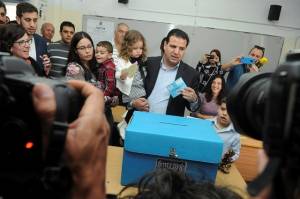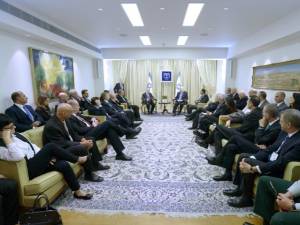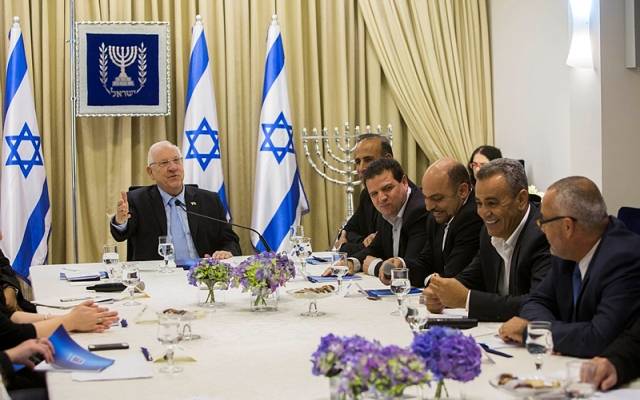Contrary to what BDS and anti-Israel activists claim, Israel’s Arabs are a vibrant and important segment of society, and many say they are proud to be Israeli.

Ayman Odeh, leader of the United Arab list, casts his vote. (Basal Awidat/Flash90)
Throughout late February and March, Israel Apartheid Week took place in 200 cities around the world, from the UK and South Africa to Canada and the USA. Anti-Israel events were held on university campuses and academic institutions, with the official aim to build Boycott, Divestment and Sanctions (BDS) campaigns against Israel while educating about Israel’s apartheid policies, as the organizers’ websites state.
Meanwhile, in Israel, the March 17th elections for the 20th Knesset (Israeli parliament) brought 13 seats to the Joint Arab List, making the united Arab party the country’s third-largest political faction.
The new government will include 16 Members of Knesset who are non-Jewish – four more than the previous Knesset. Among the 16 are four parliamentarians representing Zionist parties, including Druze MK Hamad Amar of Avigdor Liberman’s Yisrael Beitenu party, Druze MK Ayoub Kara of Netanyahu’s Likud party, and Arab MKs in Meretz and the Zionist Union.
“We see the new electoral threshold law as a blessing in disguise and hope it will increase the voting percentage among Israeli-Arabs, enabling us to reach 16 seats in the Knesset,” Emilie Moatti, the spokeswoman for the Arab Joint List, told Tazpit News Agency before the elections.
The Joint Arab List, which made its historic unification of the four Arab-dominated parties in January, has one Jewish member: Dov Khenin.
Israel Apartheid Week, in its literature, films and events, does not take note of the above nor of the fact that the head of Israel’s Central Elections Committee who oversaw the recent Israeli elections is Justice Salim Joubran, an Arab judge serving on the Supreme Court of Israel.
Israeli and Palestinian Arabs Supported by Government
Furthermore, on the economic end, more than 100 Palestinian businessmen recently participated in a conference at the Ashdod Port organized by Israel’s Civil Administration, which is part of the Coordinator of Government Activities in the Territories (COGAT), a subordinate to the Ministry of Defense. The head of the Palestinian Importers and Exporters Association, Muhammad Abu-Ein; Itzhak Blumenthal, acting CEO of the Ashdod port, and representatives of the United States Agency of International Development (USAID) and the UN Conference on Trade and Development took part in the conference held in February.
Throughout 2014, more than 1,000 Palestinians participated in various agricultural courses in Israel. Israel’s Civil Administration also sponsored, in cooperation with USAID, the planting of strawberry fields tended by Palestinian workers in the Jenin area.

President Rivlin launches Arab employment cooperation project in February 2015. (Mark Neyman/GPO)
In addition, Israeli President Reuven Rivlin met with local Arab council heads in February and, following the meeting, is launching a new employment cooperation project. The president’s office will work with the Collective Impact Initiative, which works to further the level of employment among Israeli Arab professionals. Within this framework, Rivlin will establish a quarterly business forum of managers to guide the process of integrating the Arab population into Israeli companies.
Approximately 20 percent of Israel’s eight million citizens are Arabs. According to the Israeli Democracy Index, a public opinion survey project conducted last year by the Israeli Democratic Institute and the Guttman Center for Surveys, 65% of Israeli-Arabs are proud to be Israeli.
By: Anav Silverman
Tazpit News Agency
Do You Love Israel? Make a Donation - Show Your Support!
Donate to vital charities that help protect Israeli citizens and inspire millions around the world to support Israel too!
Now more than ever, Israel needs your help to fight and win the war -- including on the battlefield of public opinion.
Antisemitism, anti-Israel bias and boycotts are out of control. Israel's enemies are inciting terror and violence against innocent Israelis and Jews around the world. Help us fight back!



